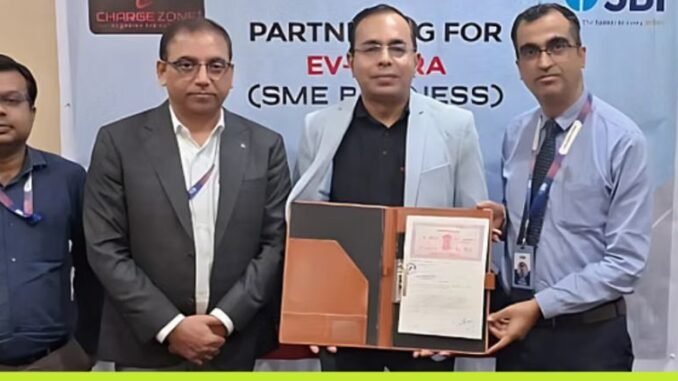
EV charging network ChargeZone has signed a strategic Memorandum of Understanding (MoU) with the State Bank of India (SBI) to provide robust financial support for its Dealer Owned, Company Operated (DoCo) EV charging program. The initiative falls under the EV Mitra scheme and is set to accelerate the deployment of charging infrastructure across India.
Unlocking Large-Scale Financing for EV Infrastructure
The partnership between ChargeZone and SBI opens up significant funding opportunities for entrepreneurs and businesses looking to set up EV charging stations. Under this agreement:
- Financing ranges from ₹10 lakh to ₹10 crore for eligible borrowers.
- Funds will support the establishment of EV charging stations under ChargeZone’s DoCo model.
- Repayment terms extend up to 7 years, making it easier for operators to manage investments.
Credit Support with Minimal Collateral Requirements
The financing will be extended under the Credit Guarantee Fund Trust for Micro and Small Enterprises (CGTMSE-India). This framework enables:
- Easier access to loans without heavy collateral requirements.
- Increased participation from micro and small enterprises in the EV infrastructure sector.
- A wider network of charging points to meet India’s growing EV demand.
A Push for Entrepreneurial Participation in the EV Sector
Commenting on the partnership, Kartikey Hariyani, Founder and CEO of ChargeZone, said:
“This partnership empowers everyday entrepreneurs, institutions, and businesses to participate in building the EV ecosystem with ease and confidence.”
Accelerating India’s EV Ecosystem
India’s electric mobility transition hinges on accessible and reliable charging infrastructure. The ChargeZone-SBI partnership addresses two major barriers:
- High upfront investment costs for setting up charging stations.
- Limited financing options for small-scale entrepreneurs.
By bridging these gaps, the initiative is expected to:
- Speed up the rollout of charging stations in both urban and semi-urban areas.
- Support government EV adoption targets under national e-mobility policies.
- Create business opportunities for a wide range of stakeholders in the clean mobility value chain.
Conclusion: With the backing of India’s largest public sector bank and a leading EV charging provider, this financing collaboration has the potential to transform India’s EV charging landscape. By enabling accessible, large-scale funding, it paves the way for a stronger, more inclusive EV ecosystem.


